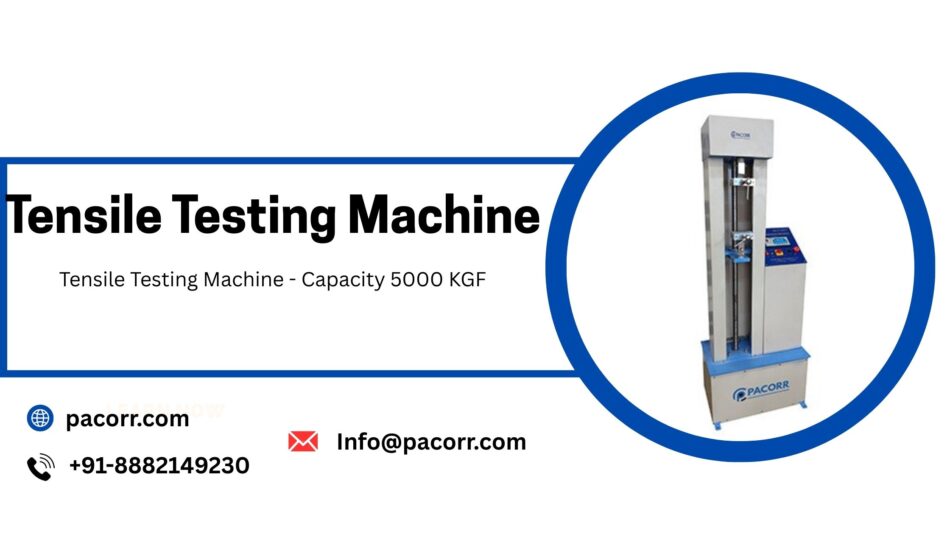At Pacorr Testing Instruments Pvt Ltd, we specialize in offering high-quality testing machines, including the Tensile Testing Machine. This critical equipment is used in a wide range of industries to test the mechanical properties of materials. Whether it’s metals, polymers, textiles, or rubber, the Tensile Testing Machine helps determine the material’s strength, elongation, and ultimate tensile strength, ensuring that the materials meet industry standards.
What is a Tensile Testing Machine?
A Tensile Testing Machine is an essential tool used to evaluate the strength and behavior of materials under tension. The test measures the material’s response to a controlled force applied at a specific rate. The force stretches the material, and the machine records data about its strength, elasticity, and elongation until it fractures or breaks.
Types of Materials Tested Using a Tensile Testing Machine
-
Metals: Used to determine the tensile strength of alloys and metals, including steel, aluminum, and copper.
-
Plastics: Polymers are tested to understand their elongation, stress-strain behavior, and how they deform under tension.
-
Textiles: Fabrics and fibers are tested to measure strength, elasticity, and how they perform under different conditions.
-
Rubber: Rubber testing is crucial for products like tires, seals, and gaskets, evaluating their flexibility and durability.
Applications of Tensile Testing
1. Quality Control
Manufacturers use Double Column Tensile Testing Machine to ensure their products meet the required specifications. This machine helps in assessing whether a material can withstand the operational stress it will experience in real-world applications. Ensuring that materials meet these standards can prevent potential failures and liabilities.
2. Research and Development
Tensile testing plays a vital role in the research and development of new materials. It helps engineers and scientists explore the mechanical properties of novel materials and refine them for specific applications. By measuring how materials react under tension, manufacturers can innovate and develop products with enhanced durability.
3. Compliance with Industry Standards
Many industries require tensile testing to comply with established standards such as ASTM, ISO, and EN. Tensile testing machines help ensure that materials used in production adhere to these regulations, ensuring both safety and performance.
4. Product Design
Tensile testing is often used during the product design phase. By understanding the tensile properties of the materials, designers can make informed decisions on the best materials for specific applications. For example, in the aerospace industry, materials need to withstand extreme stress, and tensile testing ensures that they do so.
Features of the Pacorr Tensile Testing Machine
The Tensile Testing Machine by Pacorr is engineered to deliver precise and reliable results. Here are some key features:
-
High Accuracy: Ensures that the test results are precise, providing a reliable indication of material strength.
-
User-Friendly Interface: Designed for ease of use, even for operators with minimal technical expertise.
-
Versatility: Capable of testing a wide range of materials, including metals, polymers, textiles, and more.
-
Programmable Control: Users can set parameters such as test speed, load, and displacement for more customized testing.
-
Data Logging and Analysis: The machine provides detailed reports and graphical data for in-depth analysis.
-
Durability: Built to last, the machine is designed to operate smoothly over long periods of use, providing consistent and accurate results.
How Tensile Testing Works
-
Specimen Preparation: The material sample is prepared according to industry standards, ensuring a uniform shape and size for the test.
-
Clamping: The specimen is securely clamped at both ends in the testing machine’s grips.
-
Application of Force: The machine applies a controlled force to the material. This force is gradually increased until the material breaks.
-
Data Collection: The Tensile Testing Machine – Capacity- 5000 KG records data such as stress, strain, force, and displacement. This data helps determine properties such as tensile strength, yield strength, and elongation.
-
Result Interpretation: The test results are analyzed, and the material’s mechanical properties are determined.
Benefits of Using the Pacorr Tensile Testing Machine
-
Accurate and Reliable Results: With the Tensile Testing Machine, manufacturers can be confident in their material’s quality, ensuring compliance with global standards.
-
Cost-Effective: By preventing failures in the final product, tensile testing reduces the likelihood of recalls, saving money in the long run.
-
Improved Safety: Materials that fail to meet tensile strength requirements can cause product failures. By using the Tensile Testing Machine, manufacturers can ensure their products are safe for use.
-
Enhanced Product Quality: Consistent testing improves the overall quality of the final product, ensuring it meets customer expectations.
Common Standards for Tensile Testing
To ensure uniformity across the industry, tensile tests follow established international standards. These include:
-
ASTM D638: Standard Test Method for Tensile Properties of Plastics.
-
ISO 527: Plastics – Determination of Tensile Properties.
-
ASTM E8/E8M: Standard Test Methods for Tension Testing of Metallic Materials.
-
DIN 53504: Rubber, Vulcanized or Thermoplastic – Determination of Tensile Stress-Strain Properties.
These standards provide guidelines on specimen preparation, test procedures, and result interpretation, ensuring that tensile tests are consistent and reliable across industries.
Conclusion
In today’s fast-paced manufacturing world, ensuring the quality and reliability of materials is crucial. The Tensile Testing Machine from Pacorr is an essential tool for manufacturers in various industries, from metals to plastics, textiles, and rubber. By evaluating the strength, elasticity, and durability of materials, this machine helps manufacturers produce safer, more reliable products while meeting industry standards.
For more information about our Tensile Testing Machines, visit Pacorr.com.









